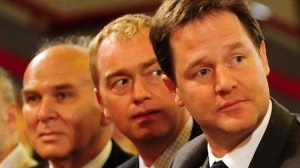What do Liberal Democrat MPs know about money?

Our recent email campaign, sharing the results of a poll, which showed an alarming lack of understanding of how money works in Britain, received this reply from the Liberal Democrats, including Nick Clegg.
The Liberal Democrats may struggle to do well in the next election, but ironically they may still be in Government if neither of the two main parties gets a big enough majority to form a functional government.
MP’s letter in italics:
I do accept that there is a problem that not enough people, including policymakers, understand how new money is created.
This is a problem for a number of reasons, not least that it can hamper attempts at effective reform of the banking system. The creation of money is a matter of significant public interest and we need to make sure it does not become an obscure and technocratic debate.
We at Positive Money agree with the Liberal Democrats that in order for MPs, and the general public, to make informed decisions about the economy we need a monetary system that works in a transparent way. We all need to understand the impact of the current system, what new proposals exist and what they might achieve. Positive Money has been working for four years to bring a simple analysis of the current system to the attention of politicians, economists and economics lecturers and teachers.
Physical cash accounts for less than 3% of the total stock of money in the economy. Commercial bank money – credit and coexistent deposits – makes up the remaining 97% of the money supply.
Banks operate under a system called “fractional reserve banking”. Simply put this is where banks lend out many more times that amount of cash and reserves they hold. Banks create new money any time they extend credit, buy existing assets or make payments on their own account. Their ability to do this is only very weakly linked to the amount of reserves they hold, and at the time of the financial crisis, for example, banks held just £1.25 in reserves for every £100 issued as credit.

This section is a real breakthrough: they quote from ‘Where Does Money Comes From?’ which Positive Money’s Andrew Jackson co-authored with the New Economics Foundation. If the first step is getting people to accept the problem, we can now move onto the next step with the Liberal Democrats and that step is to start talking about the impact of money creation by private banks.
Although commercial banks create money through lending, they cannot do so freely without limit. Banks are limited in how much they can lend if they are to remain profitable in a competitive banking system. Regulations also act as a constraint on their activities and the ultimate limit on money creation is monetary policy, governed by the Bank of England. The Bank of England aims to make sure the amount of money creation is consistent with low and stable inflation and sets base interest rates.
We disagree with the idea that the banks are sufficiently limited in the amount of money they can lend. Regulations, profitability and the Bank of England have not been able to prevent banks creating too much money for property bubbles and speculative activities, causing a financial crisis. More on this here.
Understanding how finances and our economy work is hugely important, and that’s why I’m delighted that the Coalition Government announced in 2013 that personal financial education would be added to the national curriculum for the first time. Ensuring the next generation is properly equipped to enter the workplace is hugely important, and that can’t be done without having a good grounding in how finance works.
It is very encouraging that the Liberal Democrats recognise that lack of understanding of the monetary system is damaging to the potential for reform, whether it is MPs or the general public. They are pleased that personal finance will be introduced to the curriculum. However, personal finance courses usually explain personal budget and how to get affordable credit, but rarely ever explain how money is created or consider how the wider economy is affected by the banking system.
Please keep speaking to your Liberal Democrat MPs, get a meeting if you can and ask them two things. Firstly, ask if they understand what the impact of money creation by banks has on the economy, equality and poverty. Secondly, it would be good to ask what kind of financial education for the general public would result in a suitably informed electorate.
See also:
What do Conservative MPs know about money?
What do Labour MPs know about money?